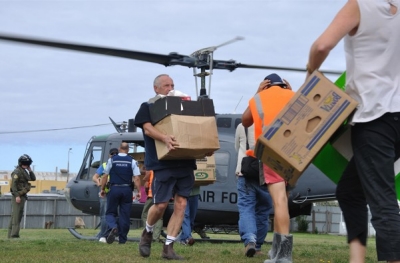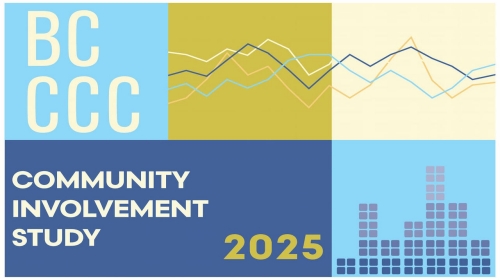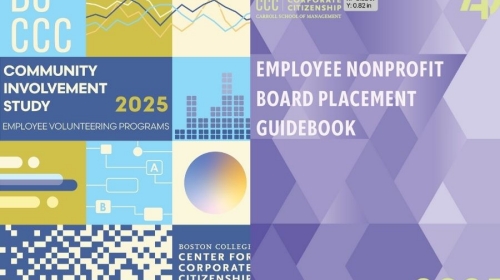WEBINAR: This webinar explores how to measure and communicate your organization's social impact with proven frameworks and strategies that matter to stakeholders.
Disaster relief in the short and long term

One of the most alarming consequences of climate change is the increase in the frequency and severity of natural disasters around the globe. According to the National Oceanographic and Atmospheric Administration, between 1980 and 2018, the average annual number of disasters was 6.3; however, over the past five years, the annual average number doubled to 12.6. As of September 2021, the U.S. has already experienced 18 significant natural disasters that each resulted in losses exceeding $1 billion.
Regardless of whether we know they are caused by climate change, extreme weather events such as this week’s historic and devastating tornadoes in Kentucky can traumatize communities through displacement, injury, and loss of life. They also pose a material threat to business operations, supply chains, employees, and sales in impacted regions. Corporate investment in preparedness and resilience—long before a disaster actually occurs—can ensure that companies can continue operations following a disaster.
Many corporate citizenship programs prioritize this particular risk—disaster relief is among the top five issues addressed by corporate giving and employee volunteer programs, according to the Boston College Center for Corporate Citizenship’s Community Involvement Study 2021. However, according to the Center for Disaster Preparedness, a majority of disaster-related corporate giving is dedicated to immediate response and relief, rather than resilience, preparedness, and recovery. While an influx of cash and supplies in the immediate months following a disaster is invaluable for affected communities, long-term resilience strategies in disaster-prone areas are just as critical. Disaster preparedness is a long-term commitment that should be part of every company’s corporate citizenship strategy.
Short-term response and relief
To allocate resources most effectively after a natural disaster, companies should employ their business strengths. In addition to donating cash and providing employee volunteers, firms can offer in-kind products and leverage corporate assets and capabilities such as infrastructure, transportation, logistics know-how, and internet/cellular networks. These philanthropic activities demonstrate how a company’s products and services benefit society in the short-term—and result in goodwill from government and consumers in the long-term. In fact, research shows that consumers look more favorably upon companies that donate in-kind after an uncontrollable disaster such as a hurricane. In this case, a clear communications strategy is paramount to ensure the donation is understood as beneficial to the disaster-affected community.
Long-term resilience, preparedness, and recovery
Companies are developing disaster response programs that are responsive to their particular operating context and communities. Microsoft Philanthropies has an established humanitarian team that evaluates disaster events to determine the scope of activities which will be supported, based on severity (the overall impact the event has had on the population and how many have been affected) and relevance (the company’s ability to positively impact the response and its overall relationship to the event).
Other firms, such as Target, have created ongoing employee relief funds into which employees can both donate or receive assistance in the event of a disaster. Local nonprofit partnerships should be an essential part of any ongoing disaster preparedness and recovery program—the UPS Foundation has a robust global partnership network, and recently deployed team members to assist partners in an effort to widen global COVID-19 vaccine access. Working with local governments and social enterprise, these executives helped develop cold chain proficiency in remote areas in Ghana and Malawi. To date, the company has delivered 1 billion COVID-19 vaccines around the world. Partnerships like these present an opportunity for a company to be directly involved in preparedness efforts for future disasters.
In this panel discussion (watch the video below) from the 2019 International Corporate Citizenship Conference, Joe Ruiz of the UPS foundation and community partners discuss collaborative best practices to enhance resilience, response, and recovery after a disaster or crisis.
Related Content
RESEARCH BRIEF - Researchers investigated how ESG activities help or hurt financial performance, using nine years of data from over 1,200 global companies.
RESEARCH BRIEF - Researchers analyzed 4 US energy exchange-traded funds (ETFs) over 15 years, including 2 dirty energy funds tracking fossil fuel companies and 2 clean energy funds tracking renewable energy companies.
RESEARCH BRIEF - Researchers conducted a survey, which measured perceptions of CSR and ethical leadership within the manufacturing and service industries.
WEBINAR: This webinar explores how corporate giving will be reshaped by the One Big Beautiful Bill. Hear directly from corporate citizenship leaders as they share innovative, real-world strategies that deliver impact for communities and results for business.
This study explores shifting trends in employee volunteering, corporate giving, and other means of corporate community involvement.
This guidebook offers insights on placing employees in nonprofit board service roles.
This study explores shifting trends in employee volunteering, corporate giving, and other means of corporate community involvement.








